If you’re searching for a sales management tool to streamline your workflow, Pipedrive might be on your radar.
Whether you’re a small business owner or part of a growing sales team, knowing if Pipedrive can boost your productivity can help you make the right choice.
So, in this Pipedrive review, you’ll discover how its features, pricing, and ease of use stack up.
Let’s dive into what it offers, its strengths, potential drawbacks, and whether it’s the right fit for you.
Disclaimer: If you buy any products through links on this site, I may earn a commission. But it doesn't make any difference to your cost, and it helps me keep this blog running. So you could always read my articles for free.
What is Pipedrive?
Pipedrive is a customer relationship management (CRM) platform with a special focus on sales teams. It is designed to help you manage your sales pipeline.
It offers a visual pipeline view, allowing you to track deals as they move through various stages. You can customize these stages to fit your sales process and use drag-and-drop functionality to move deals between them.
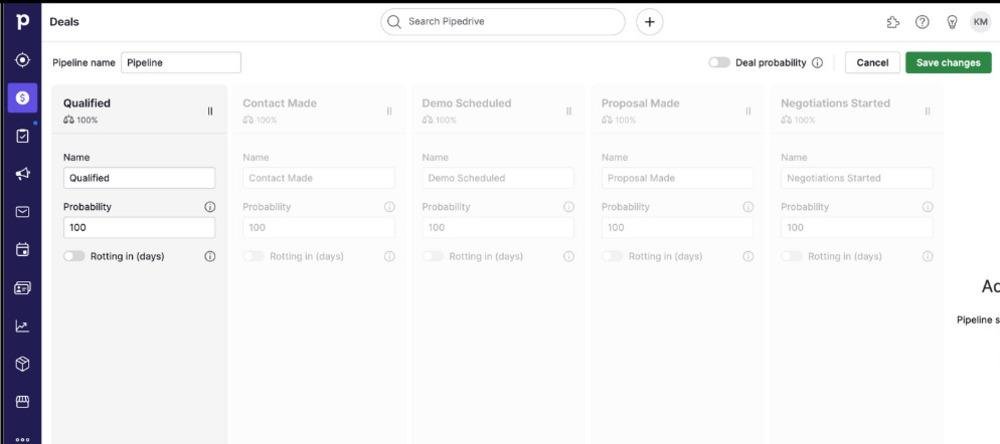
The platform also includes workflow automation, which lets you automate routine tasks such as sending email messages or creating reminders.
For example, when a deal reaches a certain stage, Pipedrive can trigger actions such as sending an email or assigning the lead to a specific team member.
Pipedrive integrates with popular email platforms like Gmail and Outlook, allowing you to track and manage communications within the CRM. This feature helps ensure all conversations with leads or clients are stored in one place.
Plus, using its analytics and reporting features, you can monitor conversion rates and deal durations, which can help you identify patterns or areas for improvement.
In the next section of this Pipedrive review, I’ll walk you through Pipedrive’s key features.
Pipedrive key features
Pipedrive is commonly used by small to medium-sized businesses across different industries.
It aims to provide a streamlined approach to managing sales processes and customer relationships. Let’s take a look at its key features in this Pipedrive review.
Chatbots
This tool allows you to interact with website visitors in real time, providing quick responses to inquiries and collecting valuable contact information.
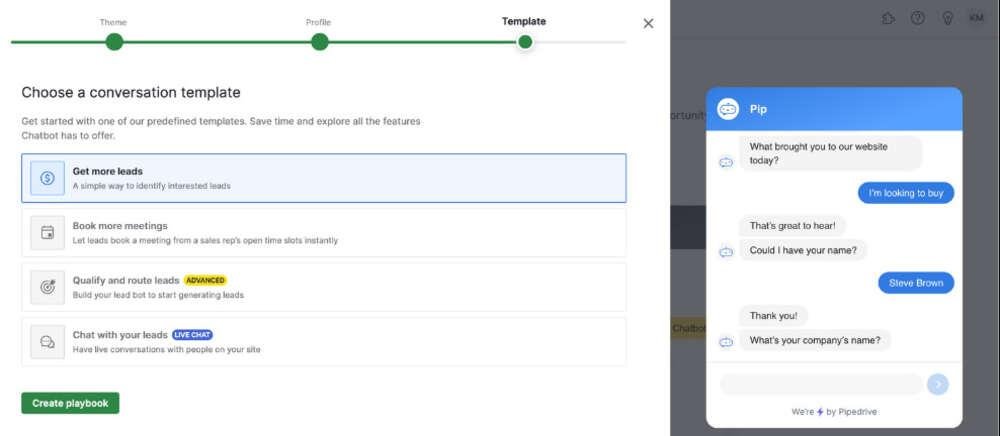
For example, if you’re managing an e-commerce site, you can set up a chatbot to greet visitors and guide them through your product offerings.
It can ask them questions like “What product are you looking for?” and, based on their answers, direct them to specific pages or connect them with a sales representative.
You can customize the chatbot’s responses to match your business needs, ensuring that it aligns with your brand’s tone and customer expectations.
The chatbot also integrates with your Pipedrive CRM, automatically logging conversations and adding new leads into your sales pipeline. This means you won’t have to manually enter contact details or worry about missing a lead.
In another scenario, if you run a service-based business, the chatbot can schedule appointments directly from the conversation. It can present available time slots and confirm bookings, helping you reduce the time spent on manual scheduling tasks.
This feature aims to keep your sales funnel active, even when your team isn’t available to engage with leads directly.
API integrations
Another feature in this Pipedrive review is Pipedrive’s API integrations, which allow you to connect it with other tools, enhancing your workflow.
The Pipedrive API offers RESTful integration with over 300 third-party apps, enabling you to sync data across platforms.
For example, if you’re using Mailchimp for email marketing, you can integrate it with Pipedrive to automatically sync contacts and track email engagement within your CRM.
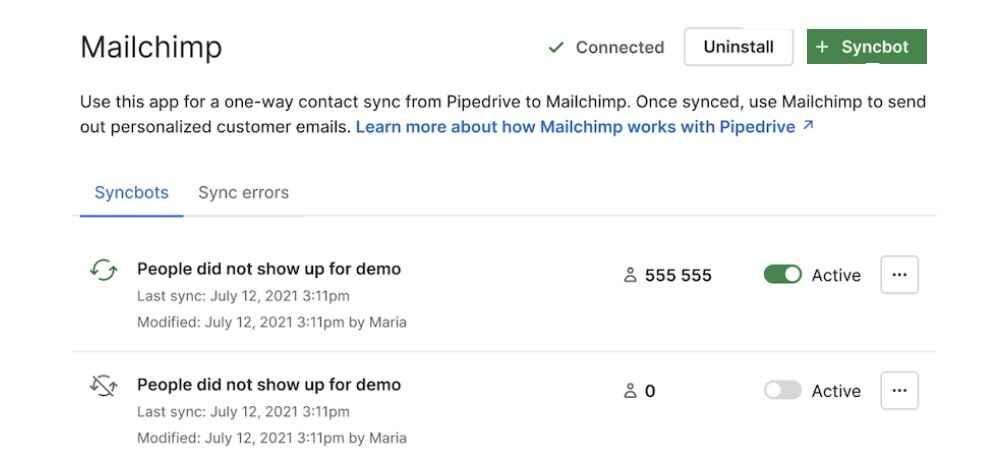
With the API, you can also connect Pipedrive to Slack. This way, your team can stay on top of deal status changes, as you can set it to send notifications directly to your Slack channels when a deal moves to the next stage.
This reduces the need to manually check the CRM and keeps everyone in the loop.
And if you have QuickBooks or Xero being used in your company, Pipedrive’s API allows you to automatically sync invoices and financial data between the two systems.
This integration helps you avoid double entry and ensures your sales and financial data are always up to date.
Pipedrive’s API also supports custom solutions. If you have a proprietary system, you can use the API to develop a custom integration that fits your specific business needs, offering flexibility for businesses with unique workflows.
The API documentation is detailed, making implementation more straightforward for developers.
Email segmentation
With Pipedrive, you can target specific groups within your contact list for personalized outreach. This feature allows you to create segments based on criteria such as deal stage, location, or custom fields.
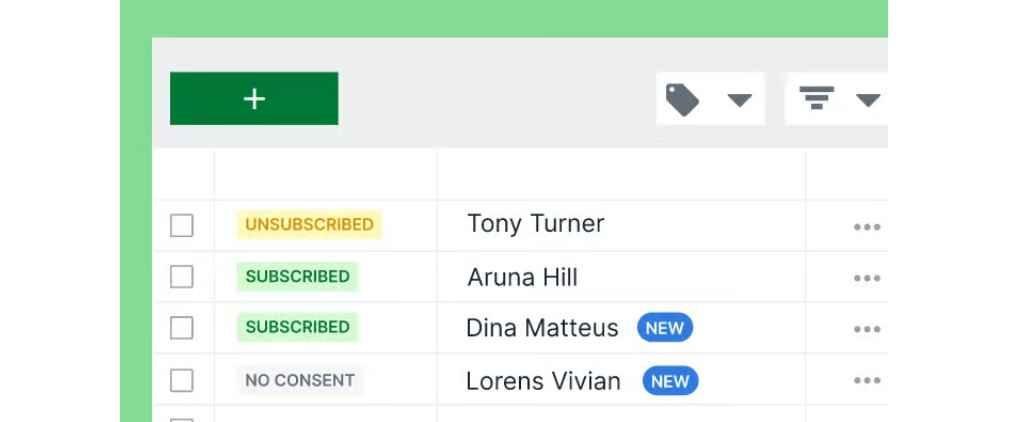
For example, if you manage a sales team and want to follow up with leads in the “Negotiation” stage, you can easily create a segment for those contacts.
Pipedrive will then allow you to send tailored emails to that group, improving your chances of closing deals.
You can also segment your contacts by previous engagement with your emails. If you’ve sent out a campaign using Mailchimp or another integrated email platform, you can track which leads opened or clicked through your emails.
By creating a segment for high-engagement contacts, you can direct your focus on leads that have a higher chance of conversion. This segmentation helps streamline your email marketing efforts, allowing for targeted, effective communication.
Templates and documents
You can create, store, and manage sales documents directly within the platform. For example, if you regularly send out proposals or contracts, you can create templates for these documents, reducing the time spent drafting them from scratch.
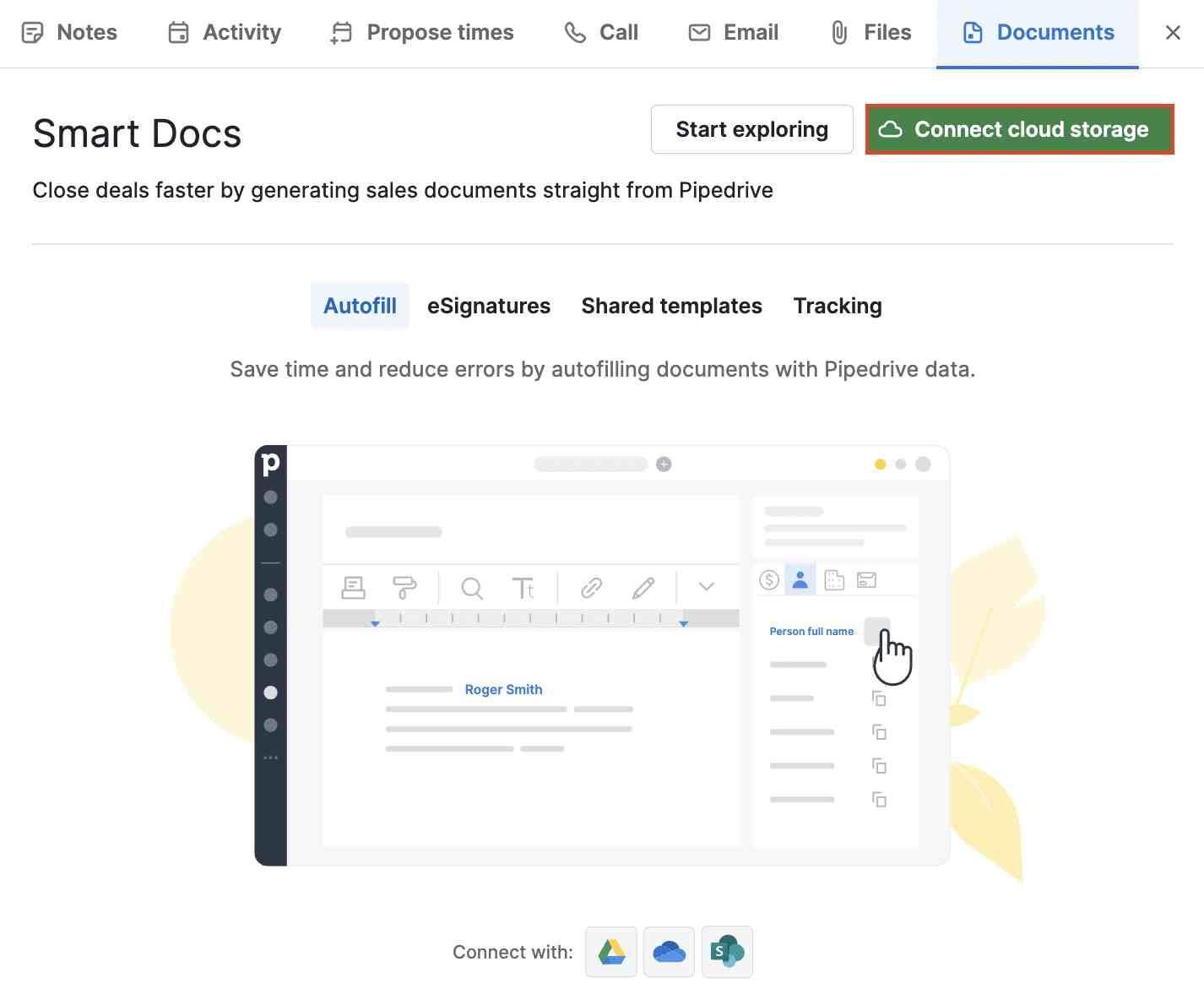
Integration with Google Drive and OneDrive allows you to upload and store important files securely, while easily attaching them to deals or contacts.
For instance, if you’re preparing a sales agreement for a client, you can select a pre-designed template, quickly fill in the details, and send it out directly from Pipedrive.
Using templates also helps you maintain consistency in your communication and avoid manual errors.
The document tracking feature also lets you see when a recipient has viewed or interacted with the document, giving you real-time insights into your sales process.
Pros and cons of Pipedrive
In this section of the Pipedrive review, I’ll discuss the advantages and disadvantages of using Pipedrive for your business.
Pipedrive pros
Customizable workflows – You can tailor Pipedrive to fit your business processes. The customizable workflows enable you to automate repetitive activities, like sending follow-up emails or reminders on specific deal stages.
Integrations – With over 300 integrations, Pipedrive connects seamlessly with popular apps like Mailchimp, Slack, and QuickBooks. This makes it easier to sync data across different tools, streamlining your workflow.
Visual sales pipeline – The visual pipeline provides a clear overview of all your deals, helping you track progress at every stage. You can quickly identify bottlenecks and take action to keep deals moving forward.
Reporting and analytics – Pipedrive’s reporting features allow you to generate detailed reports on sales performance. KPIs such as conversion rates and deal durations go a long way in letting you make informed decisions.
Pipedrive cons
Higher cost for advanced features – To access more advanced functionalities, you may need to opt for higher-tier plans. The cost can accumulate quickly, particularly if you require additional features or have a growing team.
No built-in project management – Pipedrive focuses primarily on sales CRM and lacks robust project management tools. If you need detailed project tracking and collaboration features, you may need to integrate with additional tools.
Steeper learning curve for new users – Although Pipedrive is user-friendly, new users might face a learning curve as they configure the system. Familiarizing yourself with all the features can take time.
In the next portion of this Pipedrive review, let’s discuss the pricing of Pipedrive.
Pipedrive pricing
Pipedrive offers several pricing plans to accommodate different business needs.
Essential Plan at $12 per user per month includes core CRM features, such as deal tracking, customizable pipelines, and basic email integration. It’s a good option if you’re starting out or have a small team.
Advanced Plan at $24 per user per month adds more advanced features like workflow automation, custom reporting, and a greater degree of pipeline customization. This plan is suitable if you need more robust tools for managing sales processes.
Professional Plan at $49 per user per month includes everything in the Advanced Plan plus features such as a dedicated account manager, revenue forecasting, and enhanced reporting capabilities. It’s designed for larger teams or those requiring more comprehensive support.
The Power Plan, at $59 per user per month, offers everything in the professional plan plus project planning, tracking, and delivery, increased control of account permissions and visibility, 24/7 live chat support, and Phone support. It’s ideal for larger teams that emphasize collaboration with added support.
Enterprise Plan at $79 per user per month offers everything in the power plan plus advanced customization options like enhanced security preferences, unlimited reports, and customizations, higher number of automation and email syncs per seat. This plan is ideal for large organizations with complex needs.
Conclusion: Pipedrive review
The platform offers a user-friendly interface, robust sales pipeline management, and numerous integrations that can streamline your workflow.
However, weigh these benefits against potential drawbacks, such as higher cost for advanced features and limited customization in certain areas.
If you need a straightforward, efficient CRM solution that focuses on sales management, Pipedrive might meet your needs well.
Its visual pipeline, automation tools, and integration options provide significant value, especially for small to mid-sized businesses.
However, if your requirements include extensive project management capabilities or a tighter budget, you might need to explore additional tools or plans.
Did I miss anything in this Pipedrive review? Did you try Pipedrive? Do you have any questions or comments? Share your thoughts below in the comments section.





